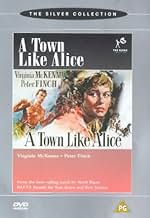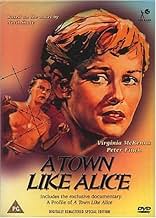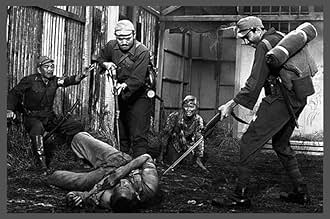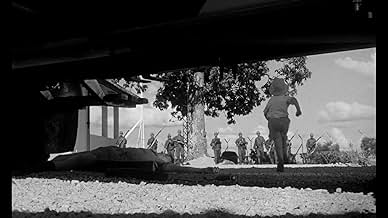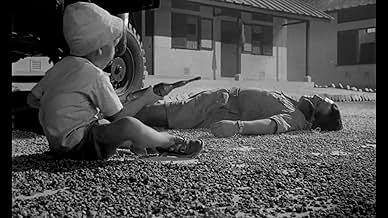IMDb RATING
7.2/10
2.1K
YOUR RATING
A newly wealthy English woman returns to Malaya to build a well for the villagers who helped her during war. Thinking back, she recalls the Australian man who made a great sacrifice to aid h... Read allA newly wealthy English woman returns to Malaya to build a well for the villagers who helped her during war. Thinking back, she recalls the Australian man who made a great sacrifice to aid her and her fellow prisoners of war.A newly wealthy English woman returns to Malaya to build a well for the villagers who helped her during war. Thinking back, she recalls the Australian man who made a great sacrifice to aid her and her fellow prisoners of war.
- Director
- Writers
- Stars
- Won 2 BAFTA Awards
- 2 wins & 5 nominations total
Kenji Takaki
- Japanese Sergeant
- (as Takagi)
Munesato Yamada
- Captain Takata
- (as Yamada)
Otokichi Ikeda
- Kempetei Sergeant
- (as Ikeda)
- Director
- Writers
- All cast & crew
- Production, box office & more at IMDbPro
7.22.1K
1
2
3
4
5
6
7
8
9
10
Featured reviews
World War Two experience from a different perspective...
Soon after the end of real hostilities in 1945, Hollywood produced the first of many subsequent films from the perspective of prisoners of war held by the Japanese: that film was Three Came Home (1950) with Claudette Colbert. I recall seeing that one a long time ago and recall the dark nature of that narrative (I have yet to submit a review here, but I will, in time).
A Town Like Alice is a different kettle of fish, so to speak: instead of a single family, it's a mix of various women and children caught up in the retreat to Singapore in 1941, and follows their seemingly unending trek across Malaya, from camp to camp, seeking admission and a final resting place to wait out the war.
The black and white photography is superb as the downtrodden party weaves its way through swamp, dirt roads, wet and dry season, very little food or water, malaria, dysentery and all other manner of tropical diseases. Little wonder that, as they walk, they also die, one at a time, from malnutrition and sickness, and all the while, their guard, an old-timer, gradually comes to admire their perseverance just as the women come to respect the old man's quiet determination to keep helping them to survive. That's the main story.
The big sub-plot is how Jean Paget (Virginia McKenna) meets Joe Harmon (Peter Finch), also a prisoner of war, and how they both come to fall in love on the run, if you know what I mean: they keep meeting (he is pressed into service as a driver for the Japanese) at different parts of Malaya as the women keep wandering around, looking for a place to stay. So, there is a bit of comedy from the irrepressible Aussie soldiers, mixed with moments of real tension as the two lovers try to keep a relationship going under such conditions. And, it's during one of those meetings that Jean learns that Joe comes from Alice Springs.
Never boring, and with stand-out scenes, such as one of the little boys running in between the advancing Japanese soldiers with his toy gun, shouting "bang, bang" (reminiscent of Brandon de Wilde in Shane [1953], doing the same thing, and annoying Jean Arthur, inside the farm house); the joy of the women when they come across an abandoned house with hot running water; and, Jean's bargaining with a Malay shop-keeper for tinned milk for a baby.
If this period in history is of interest, you could do worse to spend two hours of your time. And, as for how the romance turns out, well, you'll just have to see the movie, won't you?
A Town Like Alice is a different kettle of fish, so to speak: instead of a single family, it's a mix of various women and children caught up in the retreat to Singapore in 1941, and follows their seemingly unending trek across Malaya, from camp to camp, seeking admission and a final resting place to wait out the war.
The black and white photography is superb as the downtrodden party weaves its way through swamp, dirt roads, wet and dry season, very little food or water, malaria, dysentery and all other manner of tropical diseases. Little wonder that, as they walk, they also die, one at a time, from malnutrition and sickness, and all the while, their guard, an old-timer, gradually comes to admire their perseverance just as the women come to respect the old man's quiet determination to keep helping them to survive. That's the main story.
The big sub-plot is how Jean Paget (Virginia McKenna) meets Joe Harmon (Peter Finch), also a prisoner of war, and how they both come to fall in love on the run, if you know what I mean: they keep meeting (he is pressed into service as a driver for the Japanese) at different parts of Malaya as the women keep wandering around, looking for a place to stay. So, there is a bit of comedy from the irrepressible Aussie soldiers, mixed with moments of real tension as the two lovers try to keep a relationship going under such conditions. And, it's during one of those meetings that Jean learns that Joe comes from Alice Springs.
Never boring, and with stand-out scenes, such as one of the little boys running in between the advancing Japanese soldiers with his toy gun, shouting "bang, bang" (reminiscent of Brandon de Wilde in Shane [1953], doing the same thing, and annoying Jean Arthur, inside the farm house); the joy of the women when they come across an abandoned house with hot running water; and, Jean's bargaining with a Malay shop-keeper for tinned milk for a baby.
If this period in history is of interest, you could do worse to spend two hours of your time. And, as for how the romance turns out, well, you'll just have to see the movie, won't you?
The long road to walk
I remember my mother and my aunt watching this film when I was a little boy late once night when it came on television.
They seemed to have cried most of the way through the film. This is an image that sticks in my mind whenever this film is mentioned.
Years later my mother told me how she lost some relatives in the second world war as they tried to escape from the Japanese in Burma by trying to walk it to India. They apparently died of exhaustion
A Town Like Alice adapted from the novel by Nevile Shute looks at a group of women as they shuffle from one Japanese camp to another during occupied Malaysia but no one would take them in. Slowly one by one they perish because of malnutrition, sickness, disease or exhaustion.
During their journey they are accompanied by an old guard who slowly comes to respect them.
During the journey Virginia McKenna meets Australian soldier Peter Finch also a prisoner of war but he does his best to help them out here and there and both fall for each other. However he faces severe punishment when he is found out for stealing some chickens.
The film is told in flashback as McKenna goes back to Malaysia after the war and discovers what happened to Finch.
This is a gritty and unromanticised view of life in occupied Far East, many years before films like Empire of the Sun. Also it is unusual for not being set in a prisoner of war camp, these people want to get there and stay there.
It was filmed in Malaysia and Australia for added authenticity.
Look out for Jean Anderson, many years later she appeared in the BBC television series Tenko which was also women held in a prisoner of war camp in Malaysia.
They seemed to have cried most of the way through the film. This is an image that sticks in my mind whenever this film is mentioned.
Years later my mother told me how she lost some relatives in the second world war as they tried to escape from the Japanese in Burma by trying to walk it to India. They apparently died of exhaustion
A Town Like Alice adapted from the novel by Nevile Shute looks at a group of women as they shuffle from one Japanese camp to another during occupied Malaysia but no one would take them in. Slowly one by one they perish because of malnutrition, sickness, disease or exhaustion.
During their journey they are accompanied by an old guard who slowly comes to respect them.
During the journey Virginia McKenna meets Australian soldier Peter Finch also a prisoner of war but he does his best to help them out here and there and both fall for each other. However he faces severe punishment when he is found out for stealing some chickens.
The film is told in flashback as McKenna goes back to Malaysia after the war and discovers what happened to Finch.
This is a gritty and unromanticised view of life in occupied Far East, many years before films like Empire of the Sun. Also it is unusual for not being set in a prisoner of war camp, these people want to get there and stay there.
It was filmed in Malaysia and Australia for added authenticity.
Look out for Jean Anderson, many years later she appeared in the BBC television series Tenko which was also women held in a prisoner of war camp in Malaysia.
A strong story makes for a good film
A Town Like Alice is now an old film. However it has a certain directness and freshness which makes it quite watchable.
A Town like Alice is the story of an English nurse, who is trapped in Malaya with a group of Englihs women during the Japanese invasion. As the group can't be categorised by the Japanese army into a useful pigeonhole, they are forced to walk from city to city looking for a place to be prisoners-of-war.
The story is a strong one and the movie doesn't let the book down. Shot in excellent locations in Malaysia, the only problems are fitting the breadth of the story into a limited time.
A Town like Alice is the story of an English nurse, who is trapped in Malaya with a group of Englihs women during the Japanese invasion. As the group can't be categorised by the Japanese army into a useful pigeonhole, they are forced to walk from city to city looking for a place to be prisoners-of-war.
The story is a strong one and the movie doesn't let the book down. Shot in excellent locations in Malaysia, the only problems are fitting the breadth of the story into a limited time.
A film like no other
This is a moving film with a stunning performance by Virginia McKenna. It also has Peter Finch in a portrayal of what must be the quintessential Australian character of the period.
The film is told in flashback as Virginia McKenna's character, Jean Paget, goes back to Malaya after WW2 to help the villagers who saved her life. We learn that Jean was captured there by the Japanese along with a group of other British women and children.
They are sent from town to town on foot. However, no Japanese will take responsibility for them - they walk hundreds of miles and many die. They encounter an Australian, Joe Harman, played by Peter Finch, who finds them food and medicine. Finally, the survivors see out the rest of the war in a Malay village. After the war, Jean travels back to Malaya and then to Australia to learn of Joe's fate.
I saw this film in a packed cinema in Sydney when it was first released in 1956. I was quite young, but there would no doubt have been many in the audience who had first-hand experience of war with the Japanese, including my father. The film resonated with Australians who did not feel great love for the Japanese at the time, mainly due to their treatment of prisoners of war.
Also at that time, Australians were rarely depicted on the screen, but Aussie, Joe Harman, has a key role, which accorded with the idealised national character of the day, unfortunately including his use of derogatory terms for native peoples, common at the time.
Although much of the film was shot in the studio, there was enough location shooting in Malaya and Australia to give it a feeling of authenticity.
It is a harrowing story with many heartbreaking scenes. It vividly captures the fall of empire as the Japanese supplant the British in Malaya, and humiliate them in front of their former colonial subjects. The scenes of the women and children trudging along holding their meagre possessions or the little girl looking back as she leaves a beloved rocking horse show their comfortable lifestyles torn asunder.
Jean Paget emerges as one of the strong characters of the group. This is such a truthful performance by Virginia McKenna who looks beautiful even though she is covered in sweat and dirt for much of the film.
The story is fictional. It is based on Neville Shute's novel, which he based on the plight of a group of Dutch women in similar circumstances in Sumatra. However, it is possible they didn't actually have to walk everywhere. In that case does the film slander the Japanese?
Fresh in people's minds when the film came out, was the knowledge that the Japanese had carried out a number of death marches in the Philippines and Borneo as well as atrocities on the Thailand-Burma Railroad. Japanese troops had also been involved in the massacre of prisoners of war, nurses and tens of thousands of Chinese civilians in Singapore and elsewhere.
The events in "A Town Like Alice" may be fictionalised but they fit the modus operandi. The militaristic Japanese regime of the time looked with contempt on people who surrendered in war, and this often manifested itself in cruel treatment.
Although the Australian-made mini-series with the charismatic Bryan Brown and luminous Helen Morse brought more of the book to the screen, I don't think it diminishes this version at all - it is still unforgettable.
The film is told in flashback as Virginia McKenna's character, Jean Paget, goes back to Malaya after WW2 to help the villagers who saved her life. We learn that Jean was captured there by the Japanese along with a group of other British women and children.
They are sent from town to town on foot. However, no Japanese will take responsibility for them - they walk hundreds of miles and many die. They encounter an Australian, Joe Harman, played by Peter Finch, who finds them food and medicine. Finally, the survivors see out the rest of the war in a Malay village. After the war, Jean travels back to Malaya and then to Australia to learn of Joe's fate.
I saw this film in a packed cinema in Sydney when it was first released in 1956. I was quite young, but there would no doubt have been many in the audience who had first-hand experience of war with the Japanese, including my father. The film resonated with Australians who did not feel great love for the Japanese at the time, mainly due to their treatment of prisoners of war.
Also at that time, Australians were rarely depicted on the screen, but Aussie, Joe Harman, has a key role, which accorded with the idealised national character of the day, unfortunately including his use of derogatory terms for native peoples, common at the time.
Although much of the film was shot in the studio, there was enough location shooting in Malaya and Australia to give it a feeling of authenticity.
It is a harrowing story with many heartbreaking scenes. It vividly captures the fall of empire as the Japanese supplant the British in Malaya, and humiliate them in front of their former colonial subjects. The scenes of the women and children trudging along holding their meagre possessions or the little girl looking back as she leaves a beloved rocking horse show their comfortable lifestyles torn asunder.
Jean Paget emerges as one of the strong characters of the group. This is such a truthful performance by Virginia McKenna who looks beautiful even though she is covered in sweat and dirt for much of the film.
The story is fictional. It is based on Neville Shute's novel, which he based on the plight of a group of Dutch women in similar circumstances in Sumatra. However, it is possible they didn't actually have to walk everywhere. In that case does the film slander the Japanese?
Fresh in people's minds when the film came out, was the knowledge that the Japanese had carried out a number of death marches in the Philippines and Borneo as well as atrocities on the Thailand-Burma Railroad. Japanese troops had also been involved in the massacre of prisoners of war, nurses and tens of thousands of Chinese civilians in Singapore and elsewhere.
The events in "A Town Like Alice" may be fictionalised but they fit the modus operandi. The militaristic Japanese regime of the time looked with contempt on people who surrendered in war, and this often manifested itself in cruel treatment.
Although the Australian-made mini-series with the charismatic Bryan Brown and luminous Helen Morse brought more of the book to the screen, I don't think it diminishes this version at all - it is still unforgettable.
An often overlooked subject in WWII films
I have just posted a comment on "Merry Christmas Mr Lawrence" directed by Nagisa Oshima in the early 1980s. The main originality of MCML does not lie in its subject, as other films have dealt with Prisoner-of-War camps under the Japanese rule, the most famous of them remaining "The Bridge on the River Kwai" by David Lean (1957). As MCML is a much more recent film, it might be considered as a more realistic approach to the daily life in a camp under such circumstances; yet realistic films on this subject appeared as early as in the 1950s with works like "A Town like Alice" directed by Jack Lee, which was rejected in its time by the Cannes Film Festival for its shocking content and violence a sharp contrast with often romanticized productions where war has a glamorous aspect. "A Town like Alice" is also original for it tells war from the point of view of women, and women in conflicts are often ignored by war movies.
It has been years now since I watched "A Town like Alice". I remember it as a good and honest film about the conflict with the Japanese in the Far East. Virginia McKenna as a British nurse and Peter Finch were both convincing. It may be not the best film on WWII, yet it has an authenticity and favors a psychological and realistic approach to the characters than can attract many viewers, not just war movies freaks.
By the way, the title is a reference to the town of Alice Springs, where the story ends.
It has been years now since I watched "A Town like Alice". I remember it as a good and honest film about the conflict with the Japanese in the Far East. Virginia McKenna as a British nurse and Peter Finch were both convincing. It may be not the best film on WWII, yet it has an authenticity and favors a psychological and realistic approach to the characters than can attract many viewers, not just war movies freaks.
By the way, the title is a reference to the town of Alice Springs, where the story ends.
Did you know
- TriviaAccording to the book 'The Golden Gong---Fifty years of the Rank Organisation, its films and its stars' by Quentin Falk, "While at premiere of a Disney film, 'Robin Hood' [See: The Story of Robin Hood and His Merrie Men (1952)], he [Earl St. John] was particularly impressed by the young man who played the Sheriff of Nottingham. The name on the programme was that of Peter Finch. St. John bumped into Finch on the stairs of the theatre and invited him to come and talk business at Pinewood. Next day he gave Finch what would be a pivotal role in his burgeoning career: the Australian soldier, Joe, in A Town Like Alice (1956).
- GoofsHarry Corbett bought his Sooty puppet from a regular store---he didn't design or create it as such. It's possible therefore that Freddie might have had the same puppet before Harry Corbett gave it national fame.
- Quotes
[repeated line]
Japanese Sergeant: Japanese women walk!
- Crazy creditsOPENING CREDITS PROLOGUE: "The characters in this story are fictitious. The story itself however is based upon true fact."
- ConnectionsFeatured in A Profile of 'A Town Like Alice' (2001)
- How long is A Town Like Alice?Powered by Alexa
Details
- Release date
- Country of origin
- Languages
- Also known as
- The Rape of Malaya
- Filming locations
- Kuala Lumpur, Malaysia(establishing shot of British Government Offices - now the Sultan Abdul Samad Building)
- Production companies
- See more company credits at IMDbPro
- Runtime
- 1h 57m(117 min)
- Color
- Aspect ratio
- 1.66 : 1
Contribute to this page
Suggest an edit or add missing content


